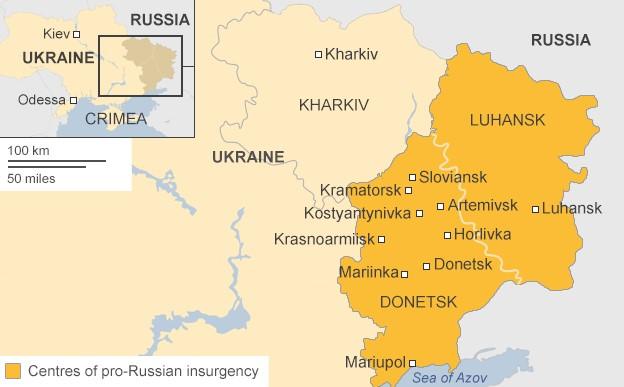Ukraine army helicopter shot down near Sloviansk, 12 dead
- Published
Amateur footage posted online appears to show the aftermath of the helicopter being downed, as the BBC's Mark Lowen reports
Pro-Russian rebels in eastern Ukraine have shot down a military helicopter near Sloviansk, killing 12 people, the Ukrainian military says.
It says the rebels used a Russian-made anti-aircraft system, and that an army general was among the dead.
The town of Sloviansk, Donetsk region, has seen fierce fighting between separatists and government forces in recent weeks.
President-elect Petro Poroshenko has vowed to tackle "bandits" in the east.
Russia has reiterated calls for Ukraine to stop its military campaign against the pro-Moscow rebels and "start a real national dialogue".
The Russian foreign ministry also urged the United States and European Union "to use all their influence on Kiev to stop Ukraine's slide into national catastrophe".

At the scene: Arkady Babchenko, Russian journalist, Donetsk Region
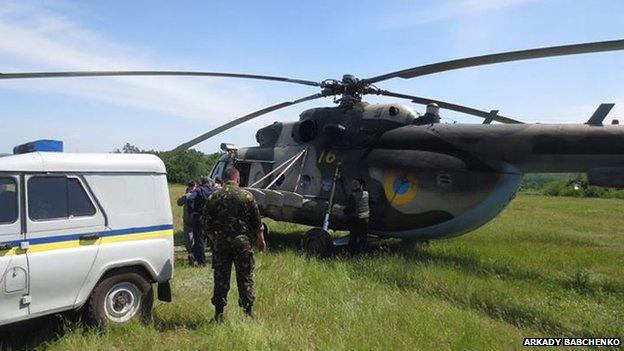
The helicopter had just taken off after transporting soldiers to a Ukrainian base
The helicopter arrived at Karachun [near Sloviansk], to unload and pick up a group of people who were finishing their tour and going on leave. They were shot down after take-off. I had talked to the pilot and also to Gen Kulchytskiy. The pilots were very nice guys - polite, correct, friendly.
Gen Kulchytskiy was very capable and very accessible. A good commander who would fly to the checkpoints where his soldiers were. He would personally bring them food and water. He kept an eye on everything.
The fighting here has become more frequent recently. In the last few days, it broke out even during the daytime. Previously, it happened only at night.
However, the last two days were relatively quiet. The army man checkpoints, preventing the forces of the People's Republic of Donetsk from moving about freely. The mood is good among the soldiers. No desertion or talk about giving up. People are in good fighting spirit.

'Terrorists'
The BBC's Mark Lowen in the region says Thursday's incident was a major blow to the Ukrainian army as it pursues its offensive against the separatists.
The helicopter was hit during heavy fighting between Sloviansk and Kramatorsk, after it had dropped off troops at a military base.
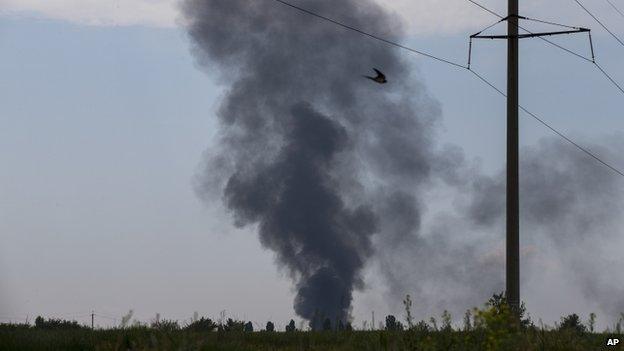
Black smoke was seen rising from the scene of the crash
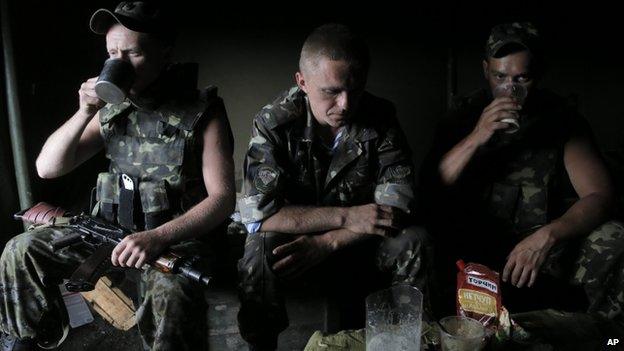
The attack was one of the worst losses of life for government forces in the conflict so far
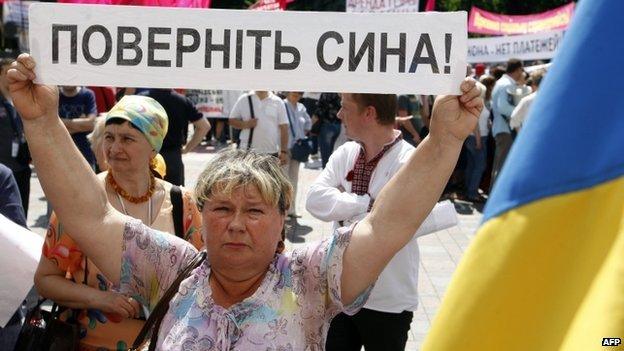
Holding up banners reading "Bring back my son", relatives of Ukrainian soldiers took to the streets of Kiev to protest against the deaths
Six National Guard soldiers - including Maj Gen Serhiy Kulchytskiy, head of combat and special training - and six members of the special forces of the interior died, the National Guard said in a statement., external
It added that the "criminals" who attacked the helicopter were later "destroyed" by Ukrainian troops involved in an "anti-terror" operation.
Earlier, outgoing acting President Olexandr Turchynov put the number killed in the helicopter incident at 14.
It is one of the worst losses of life for government forces in the conflict. Last week at least 14 soldiers died in a rebel attack on an army checkpoint near Donetsk, some 130km (80 miles) from Sloviansk.
Earlier this month, separatists shot down two army helicopters, also near Sloviansk, killing a pilot and another serviceman.
Mr Poroshenko has called the separatists "terrorists" intent on maintaining a "bandit state". After Sunday's election he vowed to tackle them "in hours", not months.

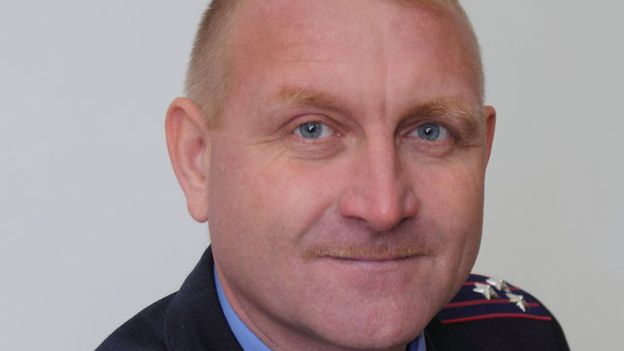
Born on 17 December 1963 in East Germany where his father served with a Soviet military contingent
Began military career as a marine platoon commander at the Soviet Northern Fleet in Murmansk Region
Moved to western Ukraine in 1992 and became deputy commander of a National Guard battalion in Ternopil
Awarded the rank of major-general by President Viktor Yanukovych in August 2013

Missing monitors
The conflict has intensified in recent days. The rebels say they lost up to 100 fighters when they tried to seize Donetsk airport on Monday.
Alexander Borodai, the separatist leader of the self-proclaimed Donetsk People's Republic, said 33 Russian nationals had been among those killed in the airport clashes.
Mr Borodai, himself a Russian citizen, added that their bodies had been identified and would be taken to Russia.
The news has fuelled accusations that Russia plays a larger part in the conflict than it currently admits, our correspondent says.
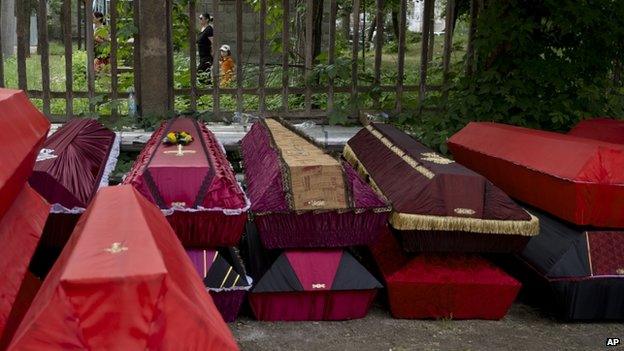
More than 30 Russian nationals died during clashes with Ukrainian troops at Donetsk airport on Monday
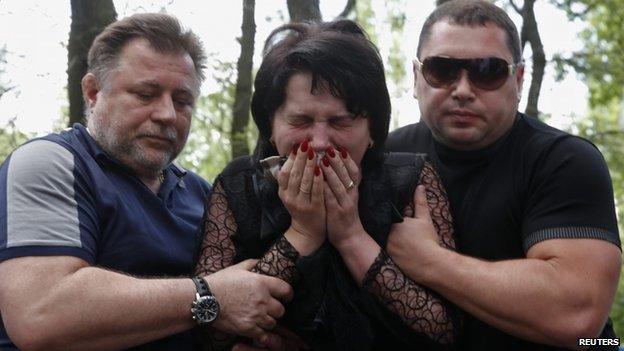
A relative mourns the death of a taxi driver who was shot on Monday during the airport clashes
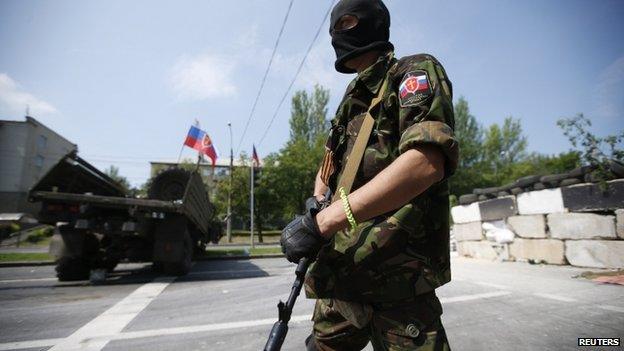
Rebels have been manning barricades in the Donetsk region, where fighting has recently intensified
Also on Monday, pro-Russia militiamen seized four international monitors working with the Organization for Security and Co-operation in Europe (OSCE).
The self-proclaimed mayor of Sloviansk, Vyacheslav Ponomaryov, told Russia's Interfax news agency they were safe and well and could be released soon.
The OSCE has said it does not know the monitors' whereabouts, but Mr Ponomaryov told another Russian news agency they were being held in the village of Makeyevka.
Pro-Russian separatists in the regions of Donetsk and Luhansk declared independence after referendums on 11 May, which were not recognised by Kiev or its Western allies.
The separatists took their cue from a disputed referendum in Crimea, which led to Russia's annexation of the southern peninsula.

Ukraine's deadliest clashes
24 April: Ukraine military kills five rebels in assault on Sloviansk
2 May: More than 40 people killed in burning building after street fighting in Odessa
9 May: 20 pro-Russian activists and Ukrainian security officer killed in Mariupol
13 May: Seven Ukrainian soldiers killed in ambush between Sloviansk and Kramatorsk
22 May: Rebel attack on checkpoint in Volnovakha leaves at least 14 soldiers dead
27 May: At least 40 rebels killed in "anti-terrorist operation" against separatists holding Donetsk airport
29 May: Ukrainian military helicopter shot down near Sloviansk, killing 12

